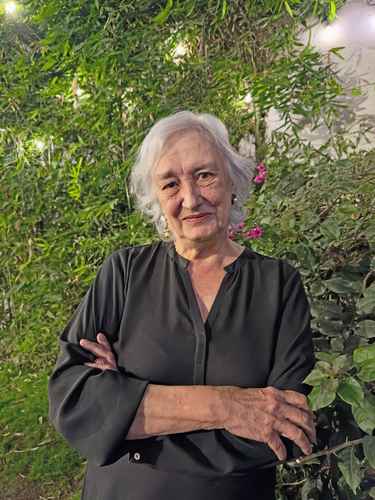You can be old and rebellious
testifies the Basque writer Arantxa Urretabizkaia in an interview during her visit to our country to participate in the Guadalajara International Book Fair (FIL). Traditional old age doesn’t let you choose
he maintains, and comments that if there is any message in his most recent novel, The last house, the thing is we can choose how to grow old
.
In the book published in Spanish by Consonni publishing house, the protagonist comes and goes through the city of Hendaye, preparing what she imagines will be her last home, making arrangements and closing accounts with the past. A house with two pine trees, wisteria bushes, a new roof and white walls is what he wants for his last period of life.
I want to be an old rebel
anticipates the author born in San Sebastián, during the conversation in the garden of a feminist bookstore in Coyoacán. Before sitting down, she admires the pink flowers on the table in front of her and comments that she finds it curious that in Mexico we call the sansevieria plant. mother-in-law’s tongue
. Urretabizkaia likes flowers, something in common with the character in her book, as well as red lipstick, and perhaps also age.
The authorities and institutions, which govern nursing homes, do not know what is coming to them.
. He begins to talk about a movement that has been going on for several years of retirees demonstrating in the streets to demand a minimum pension and other rights. Those old men are the ones who fought against Francoism, those who created clandestine schools and unions. There are women who achieved the right to abortion and divorce, and being old does not make them forget that there is a way to defend their own rights, and that rebellion is going to reach nursing homes.
.
The 77-year-old writer and journalist, who arrives dressed in black and wearing red tennis shoes to the interview, points out that we are in a time when society tells us that everything old is bad and that the only thing we can do is leave. certain age, rest and enjoy. Everything except making decisions. We no longer have a voice. We old people cannot say how we want to be cared for or how we want to live. As if your civil rights expire, but they don’t, no matter how old you are
.
On the back cover of the last house is anticipated: In this unique and attractive novel, Urretabizkaia talks about old age and avoids clichés
. However, she considers that there are no old people’s novels as such: The older people who appear in literature, even in cinema, are usually the mother or grandmother. So, as we are not used to old age being a source of fiction
.
It turns out that for the first time in the history of humanity, he highlights, an entire generation crosses the border of 80 years, at least in developed countries. But that generation, just a little bit the one that precedes me, is entering a terrain for which there are no maps. But there is a setback, because the generation before mine was not ashamed of growing old
.
So, It is better for those of you who are young to somehow manage to dignify old age and see that there is nothing to be ashamed of.
.
Write in Basque
The representative of the Basque Country participates in the FIL in Guadalajara, in which Spain is the guest of honor. Today will be part of the conversation Out loud: The feminist echo, along with Marta Breen, Lina Meruana and Silvana Paternostro as moderator. Tomorrow, in Los Lectores Presentan, we will talk about The last house.
This novel was originally published in the Basque language in 2022 with the title last house and received the Euskadi Prize for Basque Literature in 2023. For this reason, Urretabizkaia is part of a contingent from a country where Spanish is mostly spoken.
The presence of a minority language represents a miracle
; It is a language that is isolated, because it has no relationship with the others, and It is a miracle that we continue, because every year languages disappear in droves around the world, and Mexico knows about that.
.
The writer explains that people who write in Basque generally do not make a living from literature, We have another profession, in my case it is journalism
for many others it is teaching. That has a bad side, which means having less time to write. The good side is that “you have no editorial pressure. If the book doesn’t do well, your self-esteem will suffer, but your checking account won’t even notice. Then, you can venture out and say, ‘let’s see how it turns out.’”
